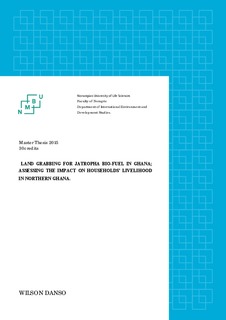| dc.description.abstract | The research focus on the impacts of large scale production of jatropha cultivation for bio-fuel and it effects it has on the local farmers in their access to land, ensuring food security and their livelihoods in the four selected local communities in the Yendi district of northern Ghana. The local communities in which the research carried out were Jimle, Kpachaa, Kpalkore and Chegu. The research analyzed jatropha production and the effects on local livelihoods with the use of sustainable livelihood approach in accessing the various assets available to the households. The Bio-fuel Africa Ltd acquired 15000 hectares of land for the production of jatropha with 400 hectares at the research area. Hundred of households were conducted for an interview to obtain information relating to some of the positive and negative impacts the company’s activities have brought onto the local people’s livelihoods. Twenty five households were selected from each community for the interview. In addition to the households who were interviewed, the management of bio-fuel Company and the local chiefs were also interviewed.
A sustainable livelihood framework was used to analyze how the production of jatropha could improve or worsen the human, financial, physical, social and natural assets of the local people in the face of external shock. The research findings indicted that majority of the local farmers who lost their land to the jatropha project experienced negative impact in their farming activities and other economic activities which affected their income level and livelihoods. The research findings also indicated that most of the households were poor with an income level less than a dollar a day. Despite the economic challenges that the households faces, those who were employed by the company had a positive impact in their income level and livelihood. The company activities also generated other social facilities such as grind-mill, dams, and a clinic for the local people which have improved their livelihoods to a certain level. It was noted from the research findings that jatropha production could be used as a means to developing rural communities if the traditional land tenure system of the local communities are adhered to and given consideration and the engagement of the local people in the project. However, when land acquisition for bio-fuel production by the foreign companies are not treated with care, it could denied the local people of their farmlands which could leads to food insecurity and worsening of their livelihoods. | nb_NO |
